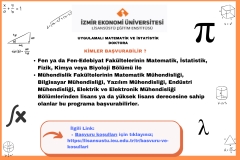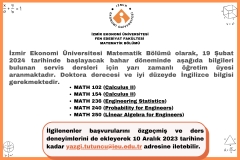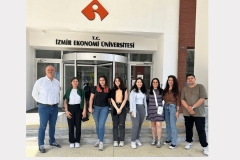
FACULTY OF ARTS AND SCIENCES
Department of Mathematics
MATH 303 | Course Introduction and Application Information
| Course Name |
Complex Analysis
|
|
Code
|
Semester
|
Theory
(hour/week) |
Application/Lab
(hour/week) |
Local Credits
|
ECTS
|
|
MATH 303
|
Fall
|
3
|
0
|
3
|
7
|
| Prerequisites |
None
|
|||||
| Course Language |
English
|
|||||
| Course Type |
Required
|
|||||
| Course Level |
First Cycle
|
|||||
| Mode of Delivery | face to face | |||||
| Teaching Methods and Techniques of the Course | Lecture / Presentation | |||||
| Course Coordinator | - | |||||
| Course Lecturer(s) | ||||||
| Assistant(s) | ||||||
| Course Objectives | Complex analysis is the study of functions of a complex variable, in particular “analytic” or complex differentiable functions. This course develops some of the rich theory of complexanalytic functions of one variable, beginning with the basic arithmetic and geometry of complex numbers and proceeding to the CauchyRiemann equations and Cauchy’s integral formula. It continues with power series representation of analytic functions, the basic theory of residues, and possible further topics. |
| Learning Outcomes |
The students who succeeded in this course;
|
| Course Description | In this course basic concepts of complex numbers will be discussed. Elementary functions; Derivative and CauchyRiemann equations; Cauchy’s integral theorem; Morera’s theorem; Zeroes of analytic functions; Maximum and minimum principle; Fundamental theorem of algebra; Laurent series; Classification of singular isolated points; residue theorem. |
|
|
Core Courses |
X
|
| Major Area Courses | ||
| Supportive Courses | ||
| Media and Management Skills Courses | ||
| Transferable Skill Courses |
WEEKLY SUBJECTS AND RELATED PREPARATION STUDIES
| Week | Subjects | Related Preparation |
| 1 | Complex Numbers | James Ward Brown and Ruel V. Churchill “Complex Variables and Applications”, Eighth Edition, MCGraw-Hill Higher Education, 2009. Section 1. |
| 2 | Elementary Functions | James Ward Brown and Ruel V. Churchill “Complex Variables and Applications”, Eighth Edition, MCGraw-Hill Higher Education, 2009. Section 3. |
| 3 | Analytic Functions | James Ward Brown and Ruel V. Churchill “Complex Variables and Applications”, Eighth Edition, MCGraw-Hill Higher Education, 2009. Section 2. |
| 4 | Analytic Functions | James Ward Brown and Ruel V. Churchill “Complex Variables and Applications”, Eighth Edition, MCGraw-Hill Higher Education, 2009. Section 2. |
| 5 | Analytic Functions | James Ward Brown and Ruel V. Churchill “Complex Variables and Applications”, Eighth Edition, MCGraw-Hill Higher Education, 2009. Section 2. |
| 6 | Integrals | James Ward Brown and Ruel V. Churchill “Complex Variables and Applications”, Eighth Edition, MCGraw-Hill Higher Education, 2009. . Section 4. |
| 7 | Integrals | James Ward Brown and Ruel V. Churchill “Complex Variables and Applications”, Eighth Edition, MCGraw-Hill Higher Education, 2009. Section .4 |
| 8 | Midterm Exam | |
| 9 | Series | James Ward Brown and Ruel V. Churchill “Complex Variables and Applications”, Eighth Edition, MCGraw-Hill Higher Education, 2009. Section 5. |
| 10 | Series | James Ward Brown and Ruel V. Churchill “Complex Variables and Applications”, Eighth Edition, MCGraw-Hill Higher Education, 2009. Section 5. |
| 11 | Residues and Poles | James Ward Brown and Ruel V. Churchill “Complex Variables and Applications”, Eighth Edition, MCGraw-Hill Higher Education, 2009. Section 6. |
| 12 | Residues and Poles | James Ward Brown and Ruel V. Churchill “Complex Variables and Applications”, Eighth Edition, MCGraw-Hill Higher Education, 2009. . Section 6. |
| 13 | Residues and Poles | James Ward Brown and Ruel V. Churchill “Complex Variables and Applications”, Eighth Edition, MCGraw-Hill Higher Education, 2009. Section 6. |
| 14 | Conformal Mapping | James Ward Brown and Ruel V. Churchill “Complex Variables and Applications”, Eighth Edition, MCGraw-Hill Higher Education, 2009. Section 9. |
| 15 | Semester review | |
| 16 | Final exam |
| Course Notes/Textbooks | James Ward Brown and Ruel V. Churchill “Complex Variables and Applications”, Eighth Edition, MCGraw-Hill Higher Education, 2009. ISBN-13: 978-9339205157 |
| Suggested Readings/Materials | S. Ponnusamy and H. Silverman, Birkhäuser, “Complex Variables with Applications”, 2006. ISBN-13: 978-0817644574 |
EVALUATION SYSTEM
| Semester Activities | Number | Weigthing |
| Participation | ||
| Laboratory / Application | ||
| Field Work | ||
| Quizzes / Studio Critiques |
2
|
10
|
| Portfolio | ||
| Homework / Assignments | ||
| Presentation / Jury | ||
| Project | ||
| Seminar / Workshop | ||
| Oral Exams | ||
| Midterm |
2
|
50
|
| Final Exam |
1
|
40
|
| Total |
| Weighting of Semester Activities on the Final Grade |
4
|
60
|
| Weighting of End-of-Semester Activities on the Final Grade |
1
|
40
|
| Total |
ECTS / WORKLOAD TABLE
| Semester Activities | Number | Duration (Hours) | Workload |
|---|---|---|---|
| Theoretical Course Hours (Including exam week: 16 x total hours) |
16
|
4
|
64
|
| Laboratory / Application Hours (Including exam week: '.16.' x total hours) |
16
|
0
|
|
| Study Hours Out of Class |
14
|
3
|
42
|
| Field Work |
0
|
||
| Quizzes / Studio Critiques |
2
|
10
|
20
|
| Portfolio |
0
|
||
| Homework / Assignments |
0
|
||
| Presentation / Jury |
0
|
||
| Project |
0
|
||
| Seminar / Workshop |
0
|
||
| Oral Exam |
0
|
||
| Midterms |
2
|
25
|
50
|
| Final Exam |
1
|
34
|
34
|
| Total |
210
|
COURSE LEARNING OUTCOMES AND PROGRAM QUALIFICATIONS RELATIONSHIP
|
#
|
Program Competencies/Outcomes |
* Contribution Level
|
||||
|
1
|
2
|
3
|
4
|
5
|
||
| 1 | To be able to have a grasp of basic mathematics, applied mathematics or theories and applications of statistics. |
X | ||||
| 2 | To be able to use advanced theoretical and applied knowledge, interpret and evaluate data, define and analyze problems, develop solutions based on research and proofs by using acquired advanced knowledge and skills within the fields of mathematics or statistics. |
X | ||||
| 3 | To be able to apply mathematics or statistics in real life phenomena with interdisciplinary approach and discover their potentials. |
X | ||||
| 4 | To be able to evaluate the knowledge and skills acquired at an advanced level in the field with a critical approach and develop positive attitude towards lifelong learning. |
X | ||||
| 5 | To be able to share the ideas and solution proposals to problems on issues in the field with professionals, non-professionals. |
|||||
| 6 | To be able to take responsibility both as a team member or individual in order to solve unexpected complex problems faced within the implementations in the field, planning and managing activities towards the development of subordinates in the framework of a project. |
|||||
| 7 | To be able to use informatics and communication technologies with at least a minimum level of European Computer Driving License Advanced Level software knowledge. |
|||||
| 8 | To be able to act in accordance with social, scientific, cultural and ethical values on the stages of gathering, implementation and release of the results of data related to the field. |
|||||
| 9 | To be able to possess sufficient consciousness about the issues of universality of social rights, social justice, quality, cultural values and also environmental protection, worker's health and security. |
|||||
| 10 | To be able to connect concrete events and transfer solutions, collect data, analyze and interpret results using scientific methods and having a way of abstract thinking. |
|||||
| 11 | To be able to collect data in the areas of Mathematics or Statistics and communicate with colleagues in a foreign language. |
|||||
| 12 | To be able to speak a second foreign language at a medium level of fluency efficiently. |
|||||
| 13 | To be able to relate the knowledge accumulated throughout the human history to their field of expertise. |
|||||
*1 Lowest, 2 Low, 3 Average, 4 High, 5 Highest
NEWS |ALL NEWS
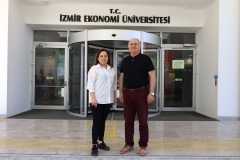
International success in mathematics
Spain-based ranking organization Scimago Institutions Ranking ranked IUE Department of Mathematics as 261st in the world and second in our country, as a
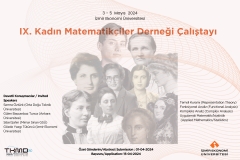
9th Workshop of Association for Turkish Women in Maths
9th Workshop of Association for Turkish Women in Maths will take place from May 03 to May 05, 2024 in Izmir, Turkey,

Our 2009 Graduate Has Been Appointed to the South Marmara Development Agency (GMKA) as the General Secretary
Onur Adıyaman, General Secretary of the Eastern Black Sea Development Agency, appointed as the General Secretary of the South Marmara Development Agency.

Young mathematicians came together at IUE
The award ceremony of the Turkish Mathematical Olympiad, which is organized to increase the interest of primary, secondary and high school students





